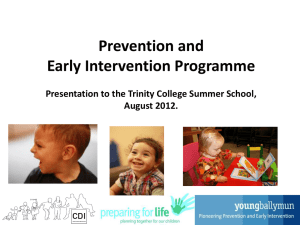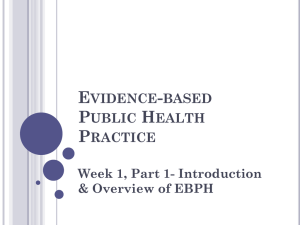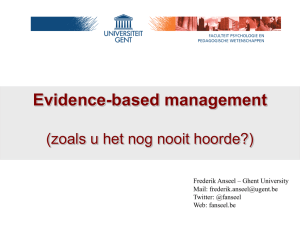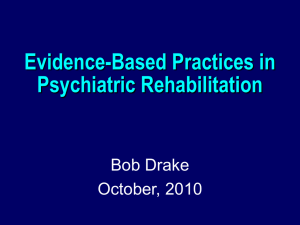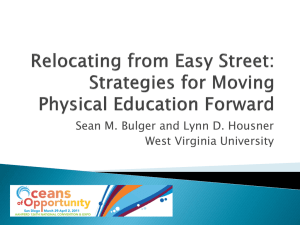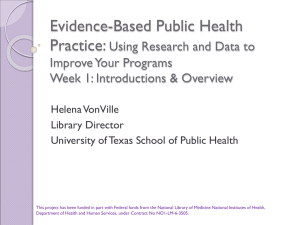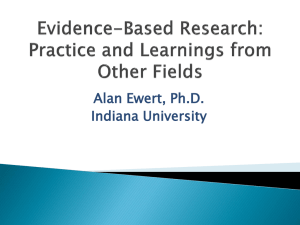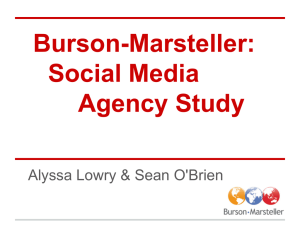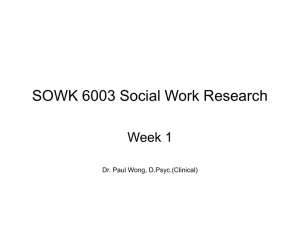Family PsychoSocial Education - WV Behavioral Health Planning
advertisement
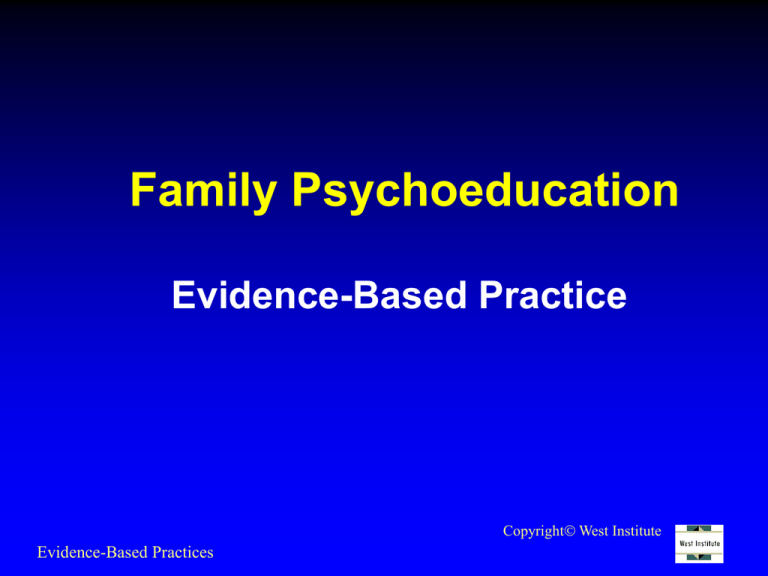
Family Psychoeducation Evidence-Based Practice Copyright West Institute Evidence-Based Practices …an opportunity for practitioners, consumers, and families to better understand and overcome the symptoms of mental illness, while maintaining hope. Copyright West Institute Evidence-Based Practices Why Focus on FPE? • People want information to help them better understand the illness process. • Consumers generally want and need the support of their families. • Families usually want to be a part of the consumer’s recovery. • People want to develop skills to get back into the mainstream of life. Copyright West Institute Evidence-Based Practices Positive Outcomes from FPE • The consumer and family work together towards recovery. • Can be as beneficial in the recovery of schizophrenia and severe mood disorders as medication. Copyright West Institute Evidence-Based Practices Research with Family Psychoeducation • This treatment is an elaboration of models developed by Anderson, Falloon, McFarlane, Goldstein and others. • Outcome studies report a reduction in annual relapse rates for medicated, community-based people of as much as 50% by using a variety of educational, supportive, and behavioral techniques. Copyright West Institute Evidence-Based Practices Research with Family Psychoeducation • Functioning in the community improves steadily, especially for employment. • Family members have less stress, improved coping skills, greater satisfaction with caretaking and fewer physical illnesses over time. Copyright West Institute Evidence-Based Practices Relapse outcomes in clinical trials 70 65 60 50 41 40 30 20 15 9 10 0 No medication Individual therapy & medication FPE & medication PEMFG & medication Copyright West Institute Evidence-Based Practices Hospitalizations before vs. during treatment 1.2 1.08 1 Mean number of 0.8 hospitalizati 0.6 ons per 0.4 year 0.2 0.27 2 yrs prior In MFG tx 0 Copyright West Institute Evidence-Based Practices Risk for relapse over two years # of relapses 10 5 0 0 5 10 15 20 Months at risk N: MFG=83; SFT=89 MFG SFT Linear (MFG) Linear (SFT) Copyright West Institute Evidence-Based Practices 25 Rehabilitation effects of multifamily groups Reducing family confusion and tension Fine-tuning and ratifying goals Coordinating efforts of family, team, consumer and employer Developing informal job leads and contacts Cheerleading and guiding in early phases of working Ongoing problem-solving Copyright West Institute Evidence-Based Practices Employment outcome FACT vs. ACT only 37.0% % employed, any job 40% ACT FACT 30% 22.2% 20% 18.5% 15.4% 15.4% 7.7% 10% 7.7% 3.7% 0% Baseline 12 mos. Gained Lost employmt. employmt. Copyright West Institute Evidence-Based Practices What is Family Psychoeducation? An approach designed to: • Help families and consumers better understand mental illness while working together towards recovery. • Recognize the family’s important role in recovery. • Help clinicians see markedly better outcomes for consumers and families. Copyright West Institute Evidence-Based Practices Central assumptions of the psychoeducational model Success in promoting change in behavior and attitude requires: the establishment of a cooperative, collegial, nonjudgmental relationship among all parties • education supplemented with continued support and guidance • breaking problems into their components and solving them in a step-wise fashion • support from a network of well-informed and like-thinking people • Copyright West Institute Evidence-Based Practices The History of Multifamily Groups • Originated 30+ years ago in a NY hospital • Families were offered education in a group format without consumers • Consumers wanted to join • Hospital staff noticed significant improvements, e.G., Increased social skills and interest in treatment amongst consumers, improved family involvement and communication Copyright West Institute Evidence-Based Practices Today, FPE is offered in select locations throughout the U.S. and in countries such as Norway, Denmark, England, Australia, China, Japan, Holland and Canada. Training is generally offered through state agencies or university programs. Copyright West Institute Evidence-Based Practices Evidence-based benefits for participants • Promotes understanding of illness, especially about vulnerability to stress, early warning signs, and recovery process • Promotes development of skills • Reduces family burden • Reduces relapse and rehospitalization • Encourages community re-integration, especially with work and earning capabilities • Promotes socialization and the formation of friendships within the group setting Copyright West Institute Evidence-Based Practices Practitioners report... • Renewed interest in work • Increased job satisfaction • Improved ability to help families and consumers deal with issues in early stages • Families and consumers take more control of recovery and feel more empowered Copyright West Institute Evidence-Based Practices Who can benefit from FPE? • Individuals with schizophrenia who are newly diagnosed or chronically ill • adolescents and young adults with prepsychotic symptoms • there is growing evidence that the following people can also benefit: - individuals with mood disorders - consumers with OCD or borderline personality disorder Copyright West Institute Evidence-Based Practices Core Elements of Psychoeducation • Joining • Education • Problem-solving • Interactional change • Structural change • Multi-family contact Copyright West Institute Evidence-Based Practices Multifamily group vs. single-family meetings • MFGs are more effective for cases with social isolation, high distress and poor response to prior treatment • Some families prefer meeting with one practitioner for the entire time • Some families want to hear what other families have done and need support • Consumers and families may need the practitioner’s guidance to decide Copyright West Institute Evidence-Based Practices Stages of treatment in family psychoeducation Joining Family and patient separately 3-6 weeks Educational workshop Families only 1 day Ongoing sessions Families and patients 1-4 years Copyright West Institute Evidence-Based Practices What Happens During Joining? • Discuss personal interests = it’s a good way to facilitate getting to know one another • Identify early warning signs of illness • Explore reactions to illness • Identify coping strategies • Review family social networks Copyright West Institute Evidence-Based Practices What Happens During Joining? (cont’d) • Identify characteristic precipitants for relapse (“triggers”) • Investigate ways to reduce burden • Offer opportunities to explore feelings of loss and “what might have been” • Share “Family Guidelines’ with consumers and family members Copyright West Institute Evidence-Based Practices The Psychoeducation Workshop An educational opportunity for families held after the joining sessions and prior to multifamily groups Copyright West Institute Evidence-Based Practices The Psychoeducational Workshop is the first time that families and individuals “come together” • • • • 6 hours of illness education relaxed, friendly atmosphere co-leaders act as hosts questions and interactions encouraged Copyright West Institute Evidence-Based Practices The workshop is held in a classroom format • • • • Promotes comfort Families can interact without pressure Encourages learning Practitioners act as educators Copyright West Institute Evidence-Based Practices Educational Workshop Agenda History and epidemiology Biology of illness Treatment: effects and side effects Family emotional reactions Family behavioral reactions Guidelines for coping Socializing Copyright West Institute Evidence-Based Practices Identifying FPE Group Participants • Consumers with similar diagnoses • Families in search of psycho-education and support • People for whom this intervention would “make a difference” with relationships and life plans Copyright West Institute Evidence-Based Practices Characteristics of Problem-solving • Borrowed from organizational management • Offers benefit of multiple, new perspectives • Complexity of method matches complexity of the situations • Need to control affect and arousal • Need to compensate for information-processing difficulties in some consumers and relatives • Need to be organized and systematic • Need to succeed and overcome failure Copyright West Institute Evidence-Based Practices Take action! • An action plan is developed for the chosen suggestion(s) • Tasks are identified and assigned • Consensus is achieved prior to leaving the meeting • The plan is reviewed at the next meeting to determine success or the need for further problem-solving Copyright West Institute Evidence-Based Practices Where can FPE groups be held? • • • • • • In-patient units Partial hospital programs Out-patient settings ACT programs Group homes Nursing homes • With NAMI chapter Copyright West Institute Evidence-Based Practices Starting a FPE group • Find a compatible co-facilitator • Attend a training and follow the manual • Explore your own motivation and enthusiasm since barriers will appear • Promote this model to your supervisor because you will need his/her support • Adhere to the problem-solving format since this is not group process Copyright West Institute Evidence-Based Practices “ I would entreat professionals not to be devastated by our illness and transmit this hopeless attitude to us. I urge them never to lose hope; for we will not strive if we believe the effort is futile.” --Esso Leete, who has had schizophrenia for 20 years
